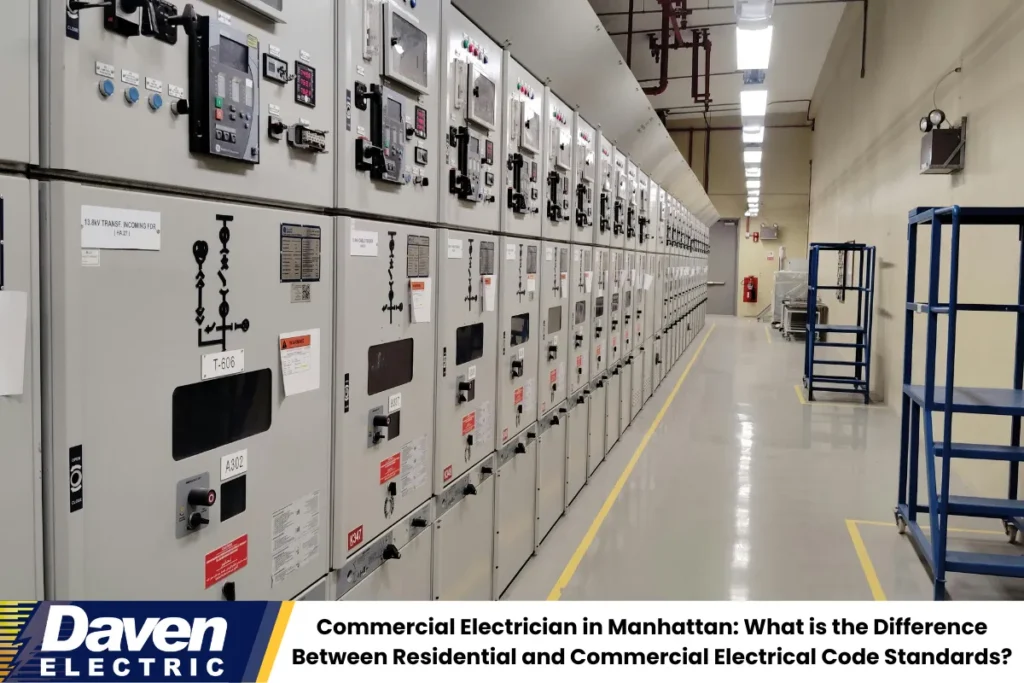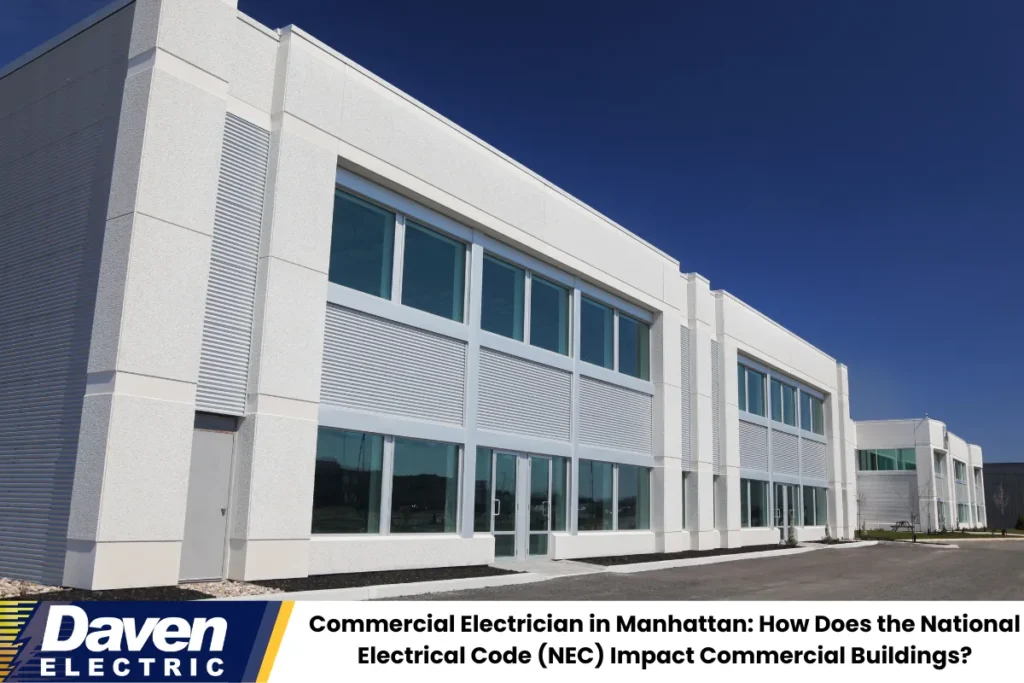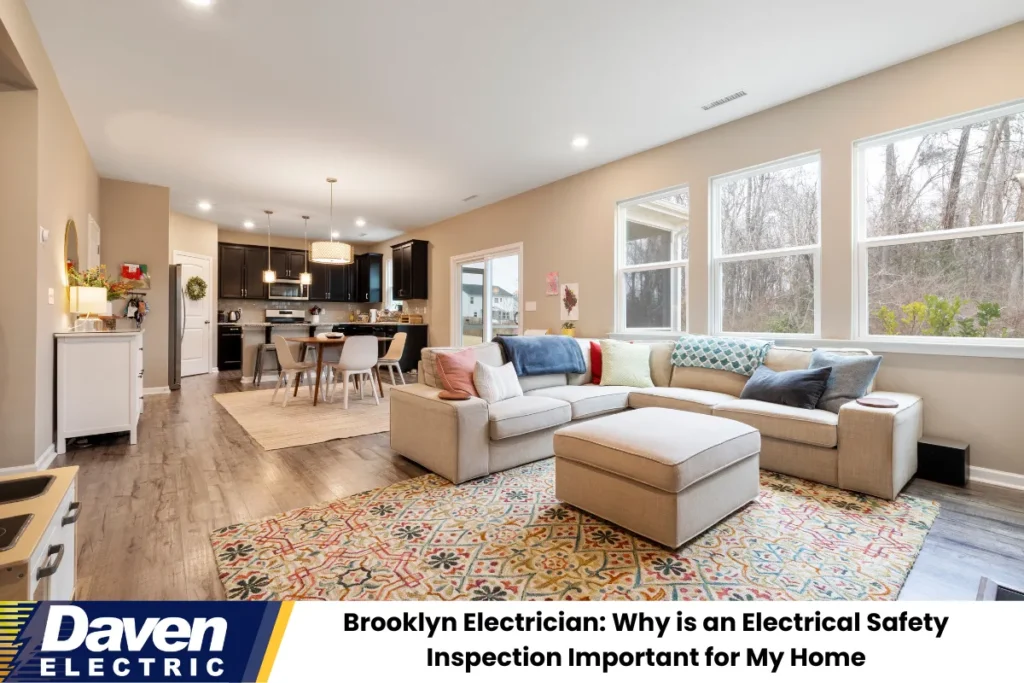Electrical Safety in New York: Why the Right Electrician Matters
Commercial electrician in Manhattan services are vital to the safety and success of any business property, yet many building owners and managers underestimate the differences between residential and commercial electrical code standards. This can lead to costly errors, failed inspections, and serious safety hazards. Many business owners believe any electrician or electrical contractor can handle all types of wiring or installations, but the reality is much more complex. The specific codes, required expertise, and compliance standards for commercial properties are far more stringent than for homes. That’s where hiring the right commercial electrician, knowledgeable in the latest code requirements and best practices, becomes crucial to keeping your business safe, compliant, and running without interruptions.
What Makes Commercial and Residential Electrical Codes So Different?
When it comes to electrical work, there’s a world of difference between wiring an apartment and upgrading the electrical systems in a high-rise office building. The codes, materials, and safety measures are not interchangeable. In Manhattan, local codes add another layer of complexity to national standards.
The National Electrical Code (NEC) as the Foundation
Both residential and commercial electricians in Manhattan rely on the National Electrical Code (NEC) as their primary guide. However, the way this code is applied differs significantly depending on the type of property. The NEC is regularly updated to address new safety challenges, but commercial applications typically require stricter adherence to these updates, with additional local amendments.
Scope of Electrical Systems: Residential vs. Commercial
Residential electrical systems are designed for single-family homes or apartment units. They are typically lower in voltage, use simpler wiring methods, and support household appliances and basic lighting.
Commercial electrical systems are far more complex. These systems often power heavy machinery, HVAC systems, security and fire alarm systems, and complex lighting layouts. The electrical contractor working in a commercial space must also consider emergency power requirements, large panel boards, and higher voltage systems.
Differences in Wiring Methods and Materials
- Residential Wiring: Typically uses non-metallic (NM) sheathed cable, commonly referred to as “Romex.” This type of wiring is sufficient for home environments but not for commercial buildings.
- Commercial Wiring: Requires more robust methods, such as conduit wiring (EMT or MC cable), which provides better protection from physical damage and meets stricter fire safety codes.
Inspections and approvals for commercial projects also involve multiple agencies, including city departments and sometimes even federal oversight if the building is used for certain business purposes.
Key Areas Where Commercial Electrical Code Differs
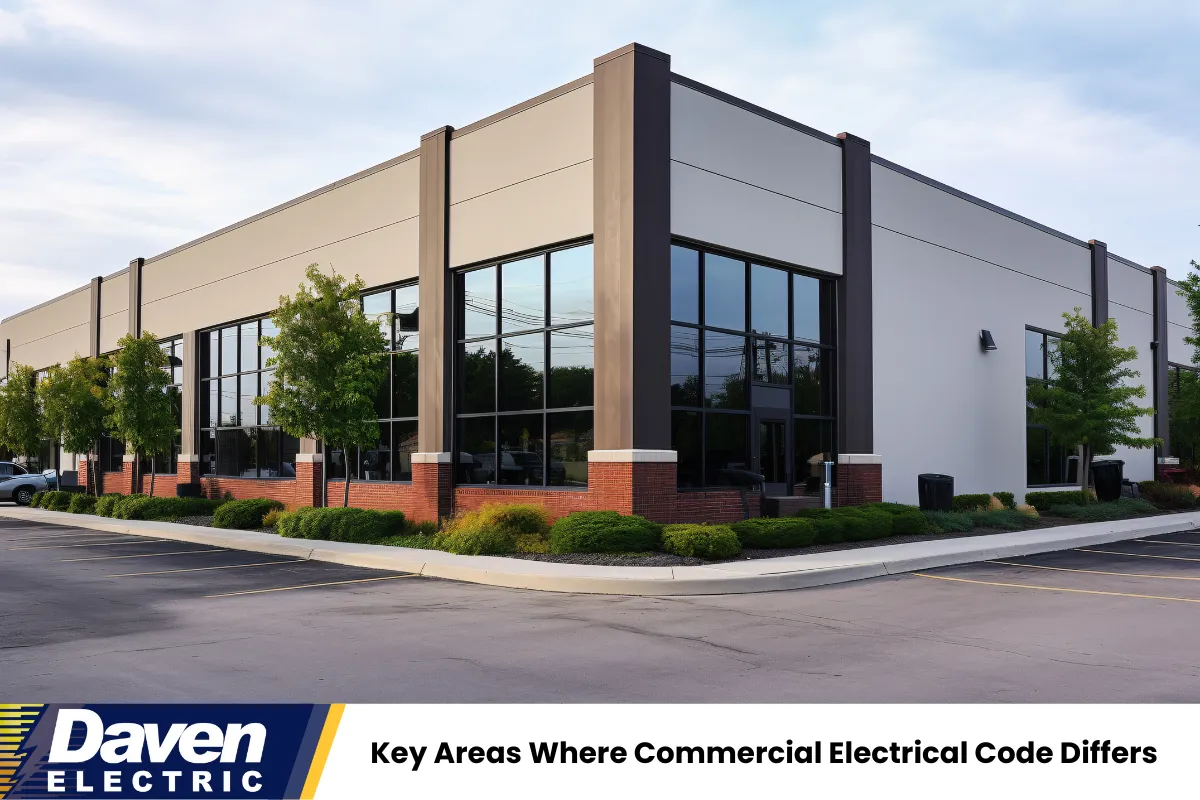
Load Calculations and Electrical Capacity
Commercial buildings in Manhattan often house dozens or even hundreds of offices, restaurants, or retail spaces under one roof. Each of these spaces has unique power needs, requiring precise load calculations to avoid overloading circuits.
- Residential: Load calculations are generally based on square footage and known appliances.
- Commercial: Must account for variable loads, specialized equipment, and redundancy for emergency systems.
Fire Safety and Emergency Systems
Fire safety is one of the most critical distinctions in commercial electrical code. Requirements in Manhattan are particularly strict, reflecting the city’s density and the importance of minimizing risk.
- Commercial buildings must install fire alarms, emergency lighting, illuminated exit signs, and backup power systems, all in compliance with strict codes.
- Residential properties usually require only basic smoke detectors and sometimes carbon monoxide alarms.
Accessibility, Zoning, and Local Amendments
In Manhattan, zoning regulations and New York City amendments to the NEC introduce further requirements for commercial spaces. Electrical contractors must ensure that systems accommodate accessibility for all users and comply with regulations specific to business districts, mixed-use buildings, and high-rise developments.
Inspection and Permitting Differences
The process of obtaining permits and passing inspections is significantly more rigorous for commercial projects. Inspections are more frequent, cover more ground, and often require the electrical contractor to demonstrate compliance with both NEC and New York City Building Code standards.
Why Businesses Need a Specialized Commercial Electrician in Manhattan
Experience with Complex Systems
A commercial electrician in Manhattan must be familiar with large-scale systems, such as:
- Three-phase power distribution
- High-voltage installations
- Smart building management systems (BMS)
- Generator and UPS (uninterruptible power supply) integration
Unlike residential electricians, commercial specialists have the training to design, install, and maintain these advanced systems safely and efficiently.
Meeting Legal Requirements to Avoid Fines and Shutdowns
Commercial properties face much higher risks if electrical work is done incorrectly. A single code violation can result in:
- Fines from the Department of Buildings
- Failed inspections and delays in opening or leasing space
- Liability in the event of an electrical fire or injury
Hiring a qualified commercial electrician ensures the work passes inspection and keeps your business open and protected.
Custom Solutions for Business Needs
Every business has unique electrical needs. Whether you’re running a restaurant that requires specialized kitchen wiring, or an office that depends on reliable data and communications infrastructure, a commercial electrician provides tailored solutions to maximize efficiency and safety.
Common Mistakes When Hiring an Electrical Contractor for Commercial Work
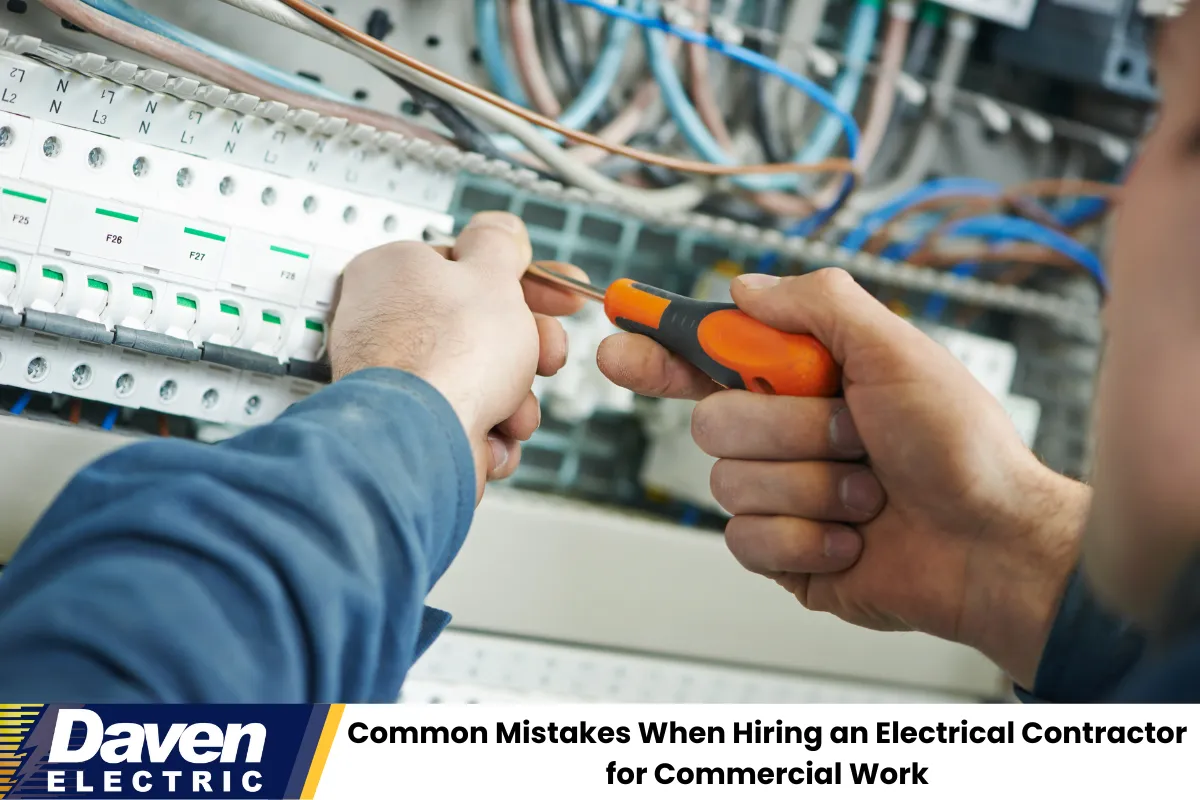
Relying on Residential Experience
One of the biggest errors property managers and business owners make is hiring a contractor with only residential experience. The codes, materials, and risks are not the same.
Overlooking Licensing and Insurance
In Manhattan, electrical contractors must hold specific licenses for commercial work. Hiring an unlicensed contractor not only puts your property at risk but may also void insurance coverage.
Ignoring Maintenance and Upgrades
Commercial electrical systems require regular inspections, testing, and maintenance to stay compliant. Skipping these steps can result in dangerous situations and legal penalties.
The Role of a Commercial Electrician in Manhattan’s Fast-Paced Business World
Specialized Knowledge and Licensing
Commercial electricians are highly trained, licensed professionals who understand the nuances of New York’s codes. They are adept at interpreting blueprints, coordinating with architects, and managing the higher technical standards required for commercial buildings.
Project Management for Businesses
- Coordination with general contractors, architects, and city inspectors.
- Adherence to strict timelines to minimize business disruption.
- Detailed recordkeeping for compliance and future maintenance.
Upgrading and Maintaining Electrical Systems
Manhattan’s commercial spaces often occupy older buildings with legacy wiring. Upgrading these systems is complex and risky without an expert.
- Replacing outdated panels and wiring.
- Adding dedicated circuits for modern equipment.
- Installing energy-efficient lighting and controls to meet local sustainability standards.
Emergency Electrical Services and Fast Response
Downtime is costly. Commercial electricians provide rapid response for power outages, equipment failures, and code violations—keeping your business running and safe for employees and customers.
Unique Electrical Challenges in Manhattan’s Commercial Properties
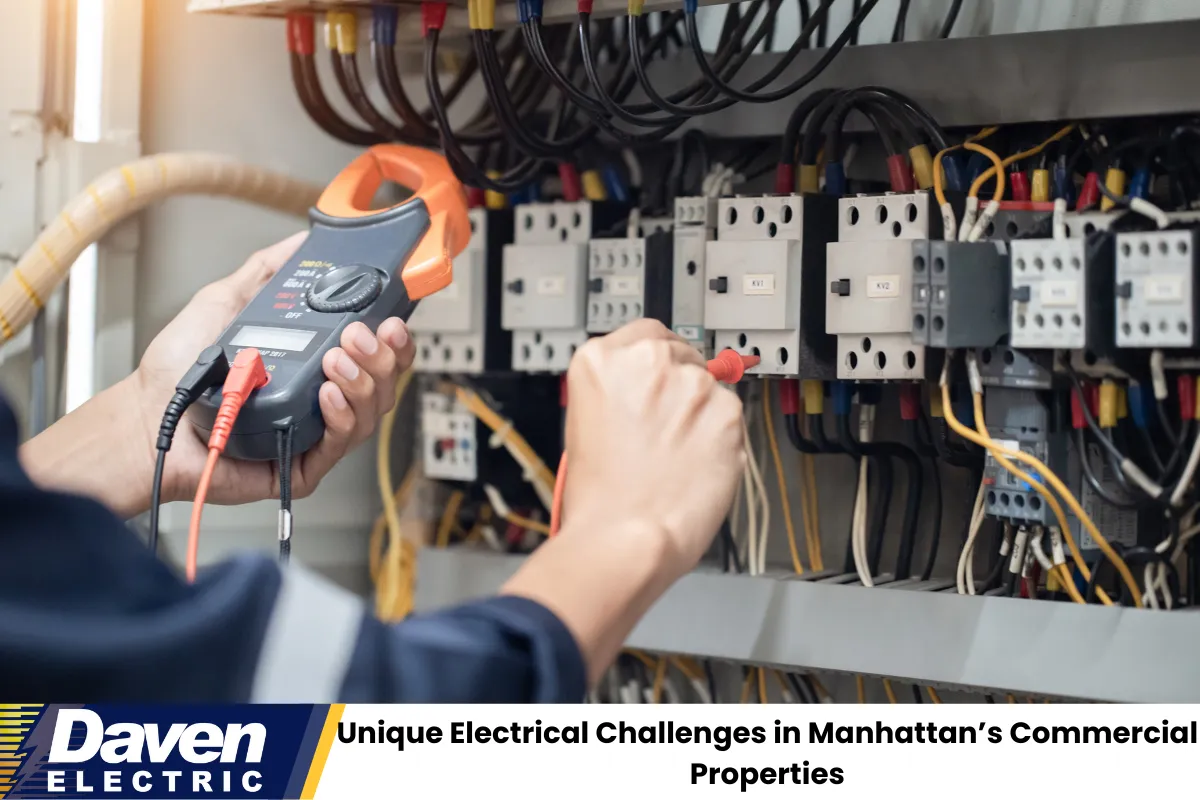
Space Constraints and Vertical Construction
With limited space and high-rise buildings, running new wiring or upgrading electrical systems requires innovative solutions:
- Vertical cable runs using raceways and busways.
- Coordination with multiple building tenants.
- Working around tight deadlines, often after-hours, to avoid disrupting business.
Energy Efficiency and Sustainability
NYC enforces strict energy codes for commercial buildings, aiming to reduce carbon emissions. Electrical contractors must be well-versed in:
- LED lighting retrofits and smart controls.
- High-efficiency HVAC systems and controls.
- Renewable energy integration, such as solar panels and battery storage.
Data, Security, and Automation
Modern commercial properties demand more than just lighting and power. Today’s electrician installs:
- Network cabling for data and communications.
- Security systems, cameras, and access control.
- Building automation systems for lights, HVAC, and energy monitoring.
Why Residential Electricians Aren’t the Right Choice for Your Manhattan Business
Code Violations and Safety Risks
A residential electrician may be highly skilled, but commercial spaces demand deeper code knowledge and experience with high-capacity systems. Using the wrong professional can result in:
- Failed inspections.
- Overloaded circuits and fire hazards.
- Insurance claim denials.
Business Disruption and Financial Loss
Hiring the right commercial electrical contractor means:
- Faster, code-compliant installations.
- Less downtime for your business.
- Fewer unexpected costs from corrections and delays.
Choosing the Best Electrical Contractor for Commercial Projects in Manhattan
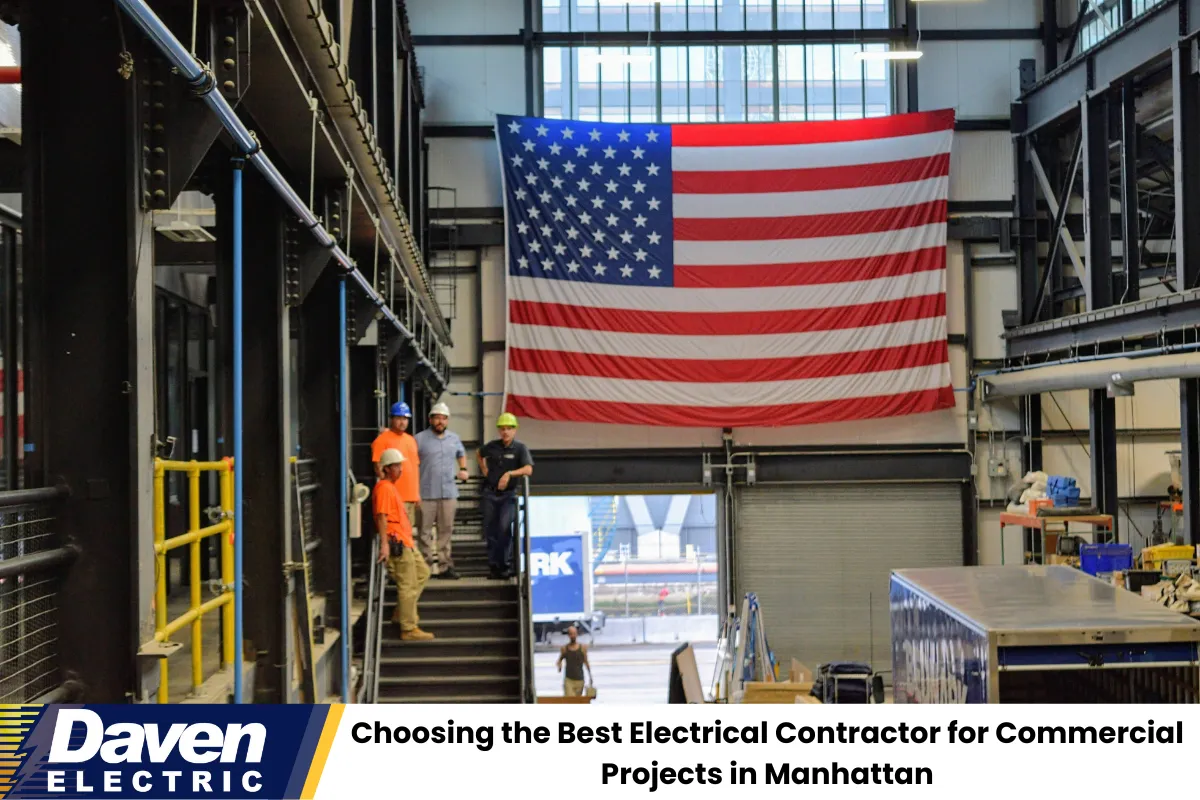
Credentials and Local Experience
Look for an electrical contractor who:
- Is fully licensed and insured for commercial work in NYC.
- Has verifiable experience with projects like yours.
- Understands the city’s permit process and code amendments.
Transparent Estimates and Communication
The best commercial electricians provide:
- Clear, itemized estimates.
- Ongoing updates throughout the project.
- Detailed documentation for future maintenance or audits.
Service Guarantees and Ongoing Support
Choose electrical services that offer:
- Maintenance contracts for ongoing compliance.
- Emergency support with guaranteed response times.
- Warranty on parts and labor.
Real-World Examples: How Professional Electricians Prevent Problems in Manhattan
Upgrading Outdated Wiring in Landmark Buildings
An office tower in Midtown needed a complete wiring overhaul to support new tenants. A skilled commercial electrician managed the project, upgraded the panels, and brought everything to code without shutting down the building—saving thousands in potential lost rent.
Emergency Repairs in Restaurants and Retail Spaces
When a popular Manhattan restaurant experienced a power outage, a commercial electrical contractor responded within the hour. They quickly identified and replaced a faulty breaker, preventing food spoilage and customer cancellations.
Ensuring Compliance and Safety in Manhattan’s High-Stakes Environment
Commercial code standards protect more than property—they safeguard employees, customers, and business investments. Working with the right commercial electrician means you can focus on running your business, not worrying about code violations, outages, or unsafe conditions. Manhattan’s unique building challenges require specialized expertise. The best electricians blend technical knowledge, experience, and fast service to deliver safe, reliable results for every project.
Commercial Electrician in Manhattan – Daven Electric Corp.
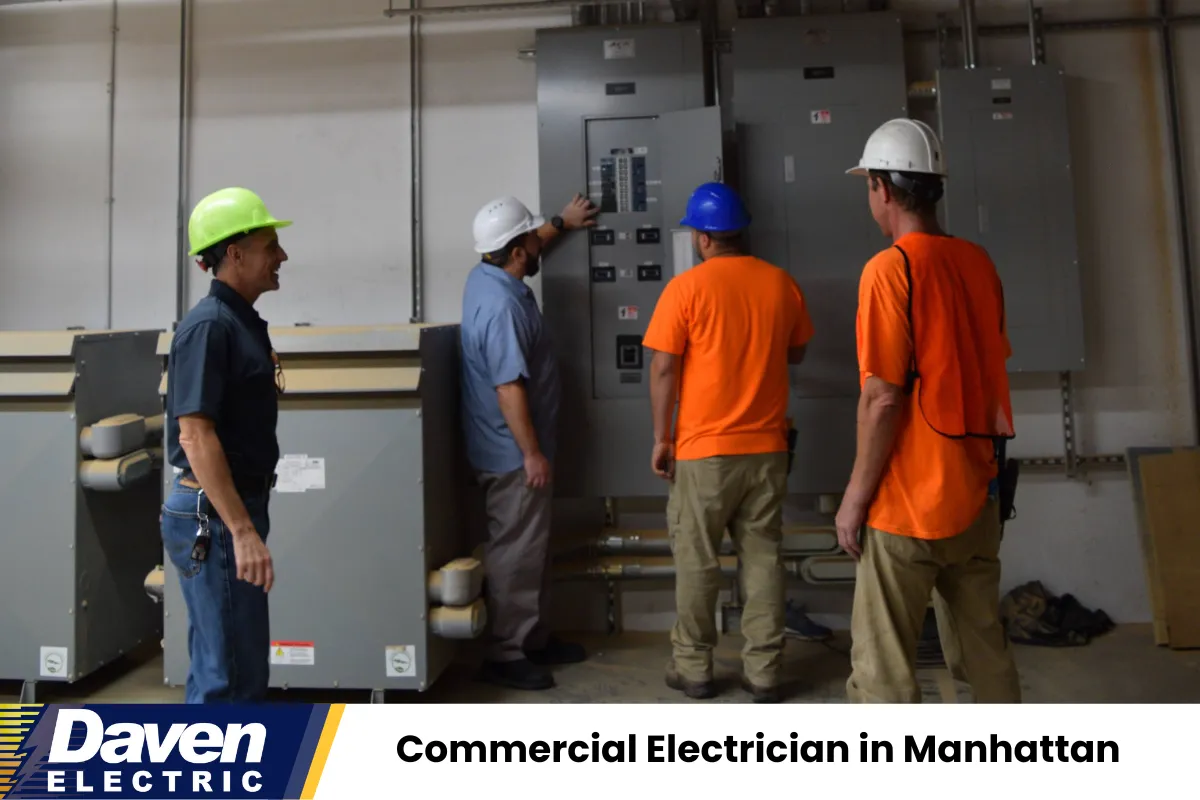
Looking for a trusted commercial electrician in Manhattan, NY? Daven Electric Corp. is your premier choice for expert electrical services tailored to businesses of all sizes. Whether you’re upgrading office wiring, need emergency repairs, or require code compliance for your property, our skilled electricians are ready to help—quickly and professionally. We understand the unique electrical code standards in Manhattan and provide solutions that keep your business safe, compliant, and running smoothly. Serving Manhattan and surrounding areas, Daven Electric Corp. offers fast response times, transparent estimates, and top-quality workmanship every time. Don’t risk costly delays or violations—call (212) 390-1106 or fill out our contact form today to schedule your free consultation with a leading Manhattan commercial electrician.
Frequently Asked Questions
1. How often should commercial electrical systems be inspected in Manhattan?
Commercial electrical systems in Manhattan should be inspected at least every three to five years, or more frequently if the building is older or houses critical operations. Regular inspections help identify potential hazards, outdated wiring, and code violations before they become major problems. After major renovations, or when changing the building’s use, a new inspection is mandatory to ensure continued compliance with NYC’s electrical and fire codes. Routine checkups by a licensed commercial electrician can help prevent unexpected downtime and ensure the safety of employees and customers.
2. What are common causes of failed electrical inspections in commercial properties?
Failed inspections often result from overloaded circuits, improper wiring methods, outdated electrical panels, and non-compliance with fire and life safety codes. Other issues include inadequate emergency lighting, missing GFCI or AFCI protection, and insufficient documentation of prior repairs or upgrades. Hiring a knowledgeable electrical contractor familiar with Manhattan’s codes can help avoid these issues, streamline approvals, and minimize costly delays.
3. Can a residential electrician legally work on commercial projects in New York City?
While some residential electricians may have the skills to handle minor commercial repairs, New York City law requires specific licenses and qualifications for commercial electrical work. Commercial electricians must meet rigorous standards for safety, code knowledge, and project complexity. Using a residential-only electrician for commercial work may violate city regulations, potentially leading to fines or the need for costly rework.
4. What’s involved in upgrading a commercial building’s electrical system in Manhattan?
Upgrading a commercial electrical system typically involves a full assessment, code compliance review, and detailed planning. This may include replacing outdated wiring, installing new panels, upgrading lighting to energy-efficient systems, and ensuring proper fire protection. Permits are required for most upgrades, and all work must pass inspections by NYC authorities. The process should always be managed by an experienced commercial electrical contractor to minimize business disruption.
5. Are there special code requirements for historic commercial buildings in Manhattan?
Yes, historic buildings often face unique electrical challenges due to their age, construction materials, and preservation guidelines. Codes may require non-invasive wiring methods, fireproof materials, and special approval for modifications. Only experienced commercial electricians familiar with both modern standards and historic preservation requirements should handle these projects to ensure safety and maintain the building’s character.

